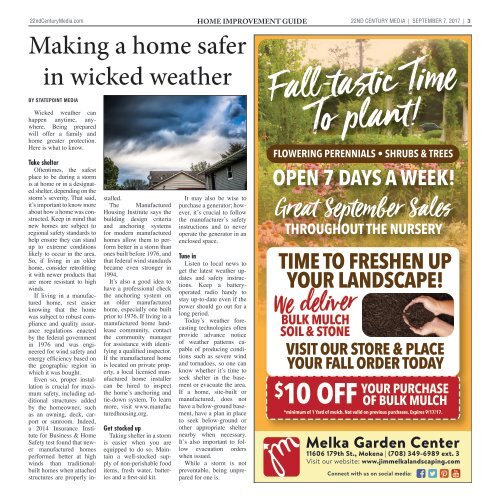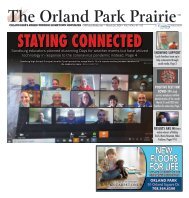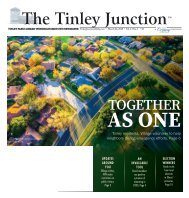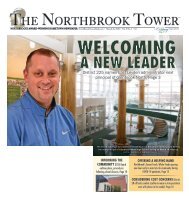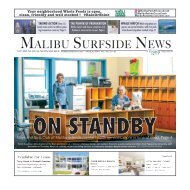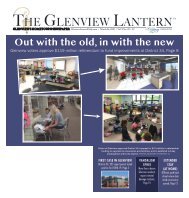SW_HI_ZB_090717
SW Home Improvement Guide ZB 090717
SW Home Improvement Guide ZB 090717
You also want an ePaper? Increase the reach of your titles
YUMPU automatically turns print PDFs into web optimized ePapers that Google loves.
22ndCenturyMedia.com home improvement Guide<br />
22nd century media | September 7, 2017 | 3<br />
Making a home safer<br />
in wicked weather<br />
BY STATEPOINT MEDIA<br />
Wicked weather can<br />
happen anytime, anywhere.<br />
Being prepared<br />
will offer a family and<br />
home greater protection.<br />
Here is what to know.<br />
Take shelter<br />
Oftentimes, the safest<br />
place to be during a storm<br />
is at home or in a designated<br />
shelter, depending on the<br />
storm’s severity. That said,<br />
it’s important to know more<br />
about how a home was constructed.<br />
Keep in mind that<br />
new homes are subject to<br />
regional safety standards to<br />
help ensure they can stand<br />
up to extreme conditions<br />
likely to occur in the area.<br />
So, if living in an older<br />
home, consider retrofitting<br />
it with newer products that<br />
are more resistant to high<br />
winds.<br />
If living in a manufactured<br />
home, rest easier<br />
knowing that the home<br />
was subject to robust compliance<br />
and quality assurance<br />
regulations enacted<br />
by the federal government<br />
in 1976 and was engineered<br />
for wind safety and<br />
energy efficiency based on<br />
the geographic region in<br />
which it was bought.<br />
Even so, proper installation<br />
is crucial for maximum<br />
safety, including additional<br />
structures added<br />
by the homeowner, such<br />
as an awning, deck, carport<br />
or sunroom. Indeed,<br />
a 2014 Insurance Institute<br />
for Business & Home<br />
Safety test found that newer<br />
manufactured homes<br />
performed better at high<br />
winds than traditionalbuilt<br />
homes when attached<br />
structures are properly installed.<br />
The Manufactured<br />
Housing Institute says the<br />
building design criteria<br />
and anchoring systems<br />
for modern manufactured<br />
homes allow them to perform<br />
better in a storm than<br />
ones built before 1976, and<br />
that federal wind standards<br />
became even stronger in<br />
1994.<br />
It’s also a good idea to<br />
have a professional check<br />
the anchoring system on<br />
an older manufactured<br />
home, especially one built<br />
prior to 1976. If living in a<br />
manufactured home landlease<br />
community, contact<br />
the community manager<br />
for assistance with identifying<br />
a qualified inspector.<br />
If the manufactured home<br />
is located on private property,<br />
a local licensed manufactured<br />
home installer<br />
can be hired to inspect<br />
the home’s anchoring and<br />
tie-down system. To learn<br />
more, visit www.manufac<br />
turedhousing.org.<br />
Get stocked up<br />
Taking shelter in a storm<br />
is easier when you are<br />
equipped to do so. Maintain<br />
a well-stocked supply<br />
of non-perishable food<br />
items, fresh water, batteries<br />
and a first-aid kit.<br />
It may also be wise to<br />
purchase a generator; however,<br />
it’s crucial to follow<br />
the manufacturer’s safety<br />
instructions and to never<br />
operate the generator in an<br />
enclosed space.<br />
Tune in<br />
Listen to local news to<br />
get the latest weather updates<br />
and safety instructions.<br />
Keep a batteryoperated<br />
radio handy to<br />
stay up-to-date even if the<br />
power should go out for a<br />
long period.<br />
Today’s weather forecasting<br />
technologies often<br />
provide advance notice<br />
of weather patterns capable<br />
of producing conditions<br />
such as severe wind<br />
and tornadoes, so one can<br />
know whether it’s time to<br />
seek shelter in the basement<br />
or evacuate the area.<br />
If a home, site-built or<br />
manufactured, does not<br />
have a below-ground basement,<br />
have a plan in place<br />
to seek below-ground or<br />
other appropriate shelter<br />
nearby when necessary.<br />
It’s also important to follow<br />
evacuation orders<br />
when issued.<br />
While a storm is not<br />
preventable, being unprepared<br />
for one is.<br />
Fall-tastic Time<br />
To plant!<br />
FLOWERING PERENNIALS • SHRUBS & TREES<br />
OPEN 7 DAYS A WEEK!<br />
Great September Salс<br />
THROUGHOUT THE NURSERY<br />
TIME TO FRESHEN UP<br />
YOUR LANDSCAPE!<br />
We deliver<br />
BULK MULCH<br />
SOIL & STONE<br />
VISIT OUR STORE & PLACE<br />
YOUR FALL ORDER TODAY<br />
$10 OFF<br />
YOUR PURCHASE<br />
OF BULK MULCH<br />
*minimum of 1 Yard of mulch. Not valid on previous purchases. Expires 9/17/17.<br />
Melka Garden Center<br />
11606 179th St., Mokena | (708) 349-6989 ext. 3<br />
Visit our website: www.jimmelkalandscaping.com<br />
Connect with us on social media:


